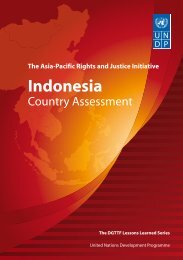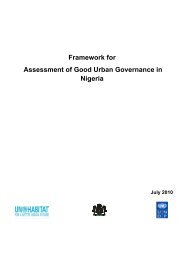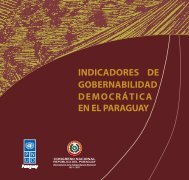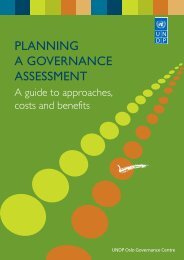A Users' Guide to Measuring Local Governance
A Users' Guide to Measuring Local Governance
A Users' Guide to Measuring Local Governance
You also want an ePaper? Increase the reach of your titles
YUMPU automatically turns print PDFs into web optimized ePapers that Google loves.
A critical step in developing an assessment is <strong>to</strong><br />
transform valued principles in<strong>to</strong> actual measurable<br />
indica<strong>to</strong>rs and operational questions, as shown in<br />
Figure 1 below.<br />
It is important that governance assessments make<br />
explicit and clear the normative assumptions that<br />
underpin them so that users may understand how<br />
the concept of “good” or “democratic” governance<br />
is being addressed. This clarifies the discourse and<br />
encourages informed dialogue with partners,<br />
other agencies and academia about the pros and<br />
cons of different approaches <strong>to</strong> governance<br />
assessments. 14 It also enables end-users <strong>to</strong><br />
ascertain what assessments are actually saying –<br />
and what they are not.<br />
The norms that underpin UNDP’s governance<br />
assessments include principles of democratic<br />
governance (transparency, accountability,<br />
participation) and also a concern with the rights,<br />
needs and interests of the poor, women and other<br />
vulnerable groups. The detailed and contextspecific<br />
nature of local governance assessments<br />
provide a mechanism for identifying the obstacles<br />
that hinder the economic, political, social and<br />
cultural advancement of the poor, women and<br />
other vulnerable groups. In addition, the use of<br />
participa<strong>to</strong>ry methods of data collection, by giving<br />
voice <strong>to</strong> the poor, women and other vulnerable<br />
groups, can draw attention <strong>to</strong> governance issues<br />
that had previously been ignored.<br />
Figure 1. Operationalising principles<br />
Principles of<br />
democratic<br />
governance<br />
e.g.accountability<br />
Specific indica<strong>to</strong>rs<br />
e.g. public review of<br />
the budget<br />
Operational<br />
questions<br />
e.g. does the local<br />
government<br />
announce and<br />
disclose the budget<br />
for public review<br />
Profile of<br />
democratic<br />
governance<br />
Box 3.<br />
The normative basis of an assessment<br />
All local governance assessment frameworks are based on normative, value-oriented, prescriptive principles. To date<br />
there is not one integrated framework for “good” local governance, and the priority for each particular assessment is <strong>to</strong><br />
endorse a combination of normative principles that will guide it.The examples below illustrate the guiding values and<br />
principles that form the basis of selected assessment frameworks that can be found in the Source <strong>Guide</strong>.<br />
International IDEA Democracy at the <strong>Local</strong> Level<br />
1 Representative Democracy (equality, equity)<br />
2 Participa<strong>to</strong>ry Democracy (openness, fairness,<br />
transparency, responsiveness, accountability)<br />
Good <strong>Governance</strong> for <strong>Local</strong> Development – GOFORGOLD<br />
1 Representation<br />
2 Participation<br />
3 Accountability<br />
4 Transparency<br />
5 Effectiveness<br />
6 Security<br />
7 Equity<br />
<strong>Local</strong> <strong>Governance</strong> Barometer (LGB)<br />
1 Effectiveness<br />
2 Transparency and Rule of Law<br />
3 Accountability<br />
4 Participation and civic engagement<br />
5 Equity<br />
UN-HABITAT Urban <strong>Governance</strong> Index<br />
1 Effectiveness<br />
2 Equity<br />
3 Participation<br />
4 Accountability<br />
14<br />
Donor Approaches <strong>to</strong> <strong>Governance</strong> Assessments, DAC Network on <strong>Governance</strong>, OECD, June 2008 (final draft)<br />
10 UNDP Oslo <strong>Governance</strong> Centre




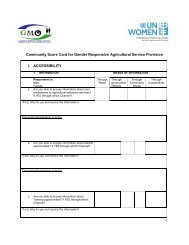

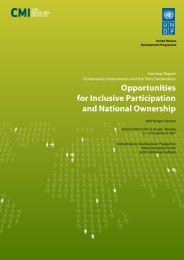
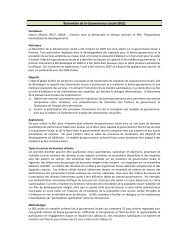
![GuÃa del Usuario ] - Governance Assessment Portal](https://img.yumpu.com/44740603/1/190x253/gua-a-del-usuario-governance-assessment-portal.jpg?quality=85)
